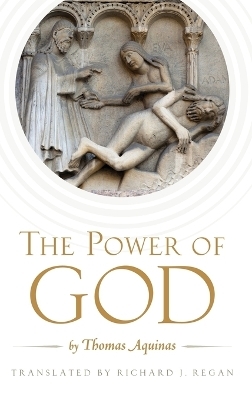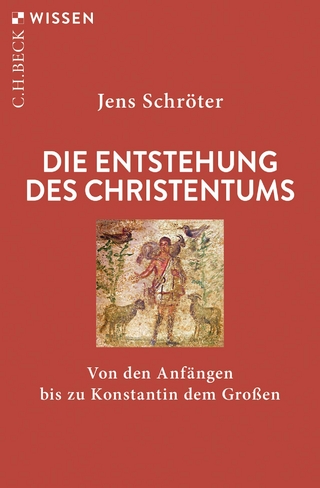
The Power of God
Oxford University Press Inc (Verlag)
978-0-19-991439-5 (ISBN)
Richard Regan is Professor of Philosophy at Fordham University.
Biblical Abbreviations ; Other Abbreviations ; Introduction ; Question 1: Creation, The Power of God Absolutely ; Articles ; 1. Is There Power in God? ; 2. Is God's Power Infinite? ; 3. Are Things Impossible for Nature Possible for God? ; 4. Should We Judge Something to Be Possible or Impossible by Lower or Higher Causes? ; 5. Can God Cause Things That He Does Not Cause and Abandon Things That He Causes? ; 6. Can God Do Things Possible for Others, Such as Sinning, Walking, and the Like? ; 7. Why Do We Call God Almighty? ; Question 2: The Power in the Godhead to Generate ; Articles ; 1. Is There a Power in the Godhead to Generate? ; 2. Do We Speak of the Generative Power in God Essentially or Notionally? ; 3. Does the Generative Power Proceed to the Act of Generation at the Will's Command? ; 4. Can There Be Several Sons in God? ; 5. Is the Power to Generate Included in Omnipotence? ; 6. Are the Power to Generate and the Power to Create the Same? ; Question 3: Creation, The First Effect of Divine Power ; Articles ; 1. Can God create Something Out of Nothing? ; 2. Is Creation a Change? ; 3. Is Creation Something Really in a Creature, or If It Is, What Is It? ; 4. Is the Power to Create and the Act of Creation Communicable to a Creature? ; 5. Can There Be Anything That God Did Not Create? ; 6. Is There Only One Source of Creation? ; 7. Is God Active in the Actions of Nature? ; 8. Does God Act in Nature by Creating, That Is, Is Creation Involved in Nature's Action? ; 9. Does Creation Bring the Rational Soul into Existence, or Does the Transmission of Semen? ; 10. Is the Rational Soul Created in the Body or outside It? ; 11. Does Semen Create or Transmit the Sensory and Vegetative Souls? ; 12. Is a Sensory or Vegetative Soul in the Semen at the Moment of Its Emission? ; 13. Can Any Being from Another Being Be Eternal? ; 14. Can What Essentially Differs from God Have Always Existed? ; 15. Did Things Proceed from God by a Natural Necessity or by a Decision of His Will? ; 16. Can Multiplicity Proceed from One First Thing? ; 17. Has the World Always Existed? ; 18. Were the Angels Created before the Visible World? ; 19. Could the Angels Have Existed before the Visible World? ; Question 4: The Creation of Unformed Matter ; Articles ; 1. Did the Creation of Unformed Matter Precede in Time the Creation of Things? ; 2. Was the Formation of Matter All at Once or Successively? ; Question 5: The Preservation of Things in Existence by God ; Articles ; 1. Does God Preserve Things in Existence, or Do They Remain in Existence Intrinsically, with All God's Action Circumscribed? ; 2. Can God Communicate to a Creature to Be Intrinsically Preserved in Exiting without God? ; 3. Can God Annihilate a Creature? ; 4. Should a Creature Be Annihilated, or Is Any? ; 5. Does Heavenly Motion at Some Time Cease? ; 6. Can a Human Being Know When the Heavenly Motion Ends? ; 7. Do the Elements Remain When Heavenly Motion Ceases? ; 8. Do Action and Being Acted Upon Remain When Heavenly Motion Ceases? ; 9. Do Plants, Irrational Animals, and Minerals Remain after the World's End? ; 10. Do Human Bodies Remain When Heavenly Motion Ceases? ; Question 6: Miracles ; Articles ; 1. Can God Do Anything in Created Things outside Natural Causes? ; 2. Can We Call All the Things God Does without Natural Causes or Contrary to the Course of Nature Miracles? ; 3. Can Spiritual Creatures by Their Natural Powers Cause Miracles? ; 4. Can Good Angels and Human Beings Work Miracles by a Gift of Grace? ; 5. Do Devils Also Act to Work Miracles? ; 6. Do Angels and Devils Have Bodies by Nature United to Them? ; 7. Can Angels or Devils Assume Bodies? ; 8. Can an Angel or Devil with an Assumed Body Perform the Actions of a Living Body? ; 9. Should We Attribute Miraculous Activity to Faith? ; 10. Do Certain Sensibly Perceptible and Material Things, Deeds, or Words Force Devils to Work the Miracles That Magical Skills Seem to Cause? ; Question 7: The Simplicity of the Divine Essence ; Articles ; 1. Is God Simple? ; 2. Is the Essence or Substance in God the Same as His Existing? ; 3. Is God in a Genus? ; 4. Do We Predicate Good, Wise, Just of God as Accidents? ; 5. Do the Aforementioned Terms Signify the Divine Substance? ; 6. Are These Terms Synonymous? ; 7. Do We Predicate Such Terms of God and Creatures Univocally or Equivocally? ; 8. Is There a Relation between God and a Creature? ; 9. Do Such Relations between Creatures and God Really Exist in Creatures Themselves? ; 10. Is God Really Related to a Creature, So That the Relation Is Something in God? ; 11. Are These Temporal Relations in God Conceptually? ; Question 8: The Things That We Predicate of God Eternally ; Articles ; 1. Are the Relations Predicated of God Eternally, Which the Terms Father and Son Signify, Real or Purely Conceptual Relations? ; 2. Is Relation in God His Substance? ; 3. Do the Relations Constitute and Distinguish the Persons or Hypostases? ; 4. Does a Hypostasis Remain When We Exclude a Relation Conceptually? ; Question 9: The Divine Persons ; Articles ; 1. How is Person Related to Essence, Subsistence, and Hypostasis? ; 2. What is a Person? ; 3. Can There Be Personhood in God? ; 4. Does the Word Person Signify Something Relative to Something Absolute? ; 5. Are There Several Persons in the Godhead? ; 6. Can We Properly Predicate the Word Person in the Plural in the Godhead? ; 7. How We Predicate Numerical Terms of Divine Persons, Namely, whether Positively or Only Negatively? ; 8. Is There Any Diversity in God? ; 9. Are There Three, or More or Less, Persons in the Godhead? ; Question 10: The Procession of the Divine Persons ; Articles ; 1. Is There Procession in the Divine Persons? ; 2. Are There One or More Processions in the Godhead? ; 3. What is the Order of Procession to Relation in the Godhead? ; 4. Does the Holy Spirit Proceed from the Son? ; 5. Would the Holy Spirit Still Be from the Son if He Were Not to Proceed from Him? ; Bibliography ; Index
| Übersetzer | Richard J. Regan |
|---|---|
| Verlagsort | New York |
| Sprache | englisch |
| Maße | 239 x 160 mm |
| Gewicht | 638 g |
| Themenwelt | Geschichte ► Teilgebiete der Geschichte ► Religionsgeschichte |
| Geisteswissenschaften ► Philosophie ► Philosophie des Mittelalters | |
| Religion / Theologie ► Christentum ► Kirchengeschichte | |
| ISBN-10 | 0-19-991439-7 / 0199914397 |
| ISBN-13 | 978-0-19-991439-5 / 9780199914395 |
| Zustand | Neuware |
| Haben Sie eine Frage zum Produkt? |
aus dem Bereich


